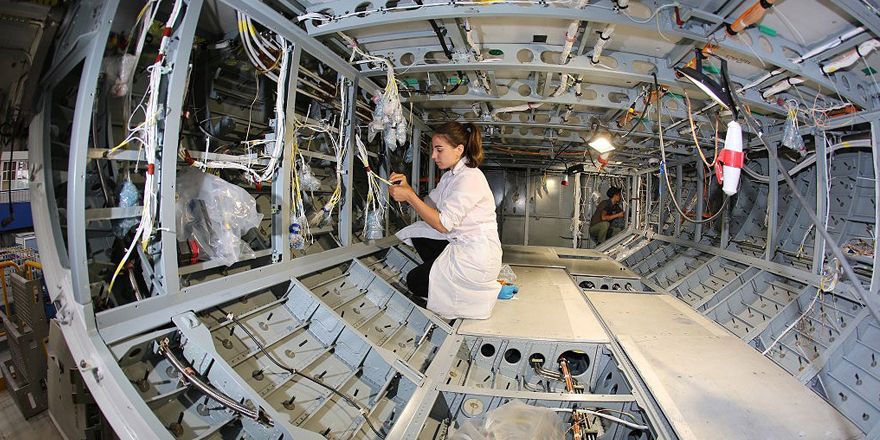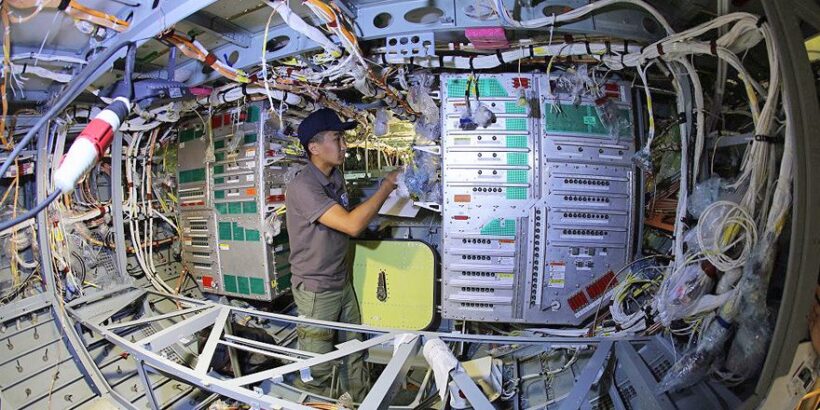The MC-21 is a next-generation, narrow-body commercial airliner, distinguished by several technological innovations, including its advanced electrical power supply system (EPS). Developed as part of Russia’s import substitution program, the EPS was engineered by domestic specialists. The first aircraft to receive the Russian-made EPS was airframe 73051 — the initial MC-21 prototype, which underwent a complete rewiring in 2022–2023. This aircraft is currently undergoing ground lightning protection tests at Yakovlev’s Flight Test and Development Complex in Zhukovsky, where specialized equipment records induced electrical parameters throughout the aircraft’s wiring network.
Two additional MC-21 prototypes—airframes 73055 and 73057 — have also been equipped with the Russian EPS. Airframe 73055 is undergoing flight testing in the Moscow region, while 73057 is being prepared by the Irkutsk Aviation Plant for transfer to the plant’s Flight Test Station to resume flight operations. Notably, airframe 73057 (MS.0013) features the finalized domestic EPS configuration, incorporating all locally produced components for power generation.
Initially, the MC-21-300’s electrical system was developed in collaboration with international suppliers. However, following the imposition of sanctions, full responsibility for the project was transferred to OKB Aerospace Systems (part of the Promtech Corporation). The new system was developed from the ground up, with qualification tests confirming the high quality and technological maturity of Russian solutions. The intelligent EPS features automatic diagnostics and reconfiguration capabilities. Combined with multi-level redundancy and smart load management, this ensures a high degree of functional safety.

The MC-21 is equipped with several power sources, including two engine-driven generators, battery packs, an auxiliary power unit (APU) generator, and a turbopump generator. In the event of a failure in any source or component, the system rapidly reconfigures itself, switching to alternative sources while prioritizing critical loads.
Vitaly Zotov, Head of the Engineering Center at OKB Aerospace Systems, emphasizes the system’s functional safety: “Even if an individual component fails, the system is designed to prevent a total loss of electrical power, which could otherwise lead to an emergency situation.”
For the first time in Russian civil aviation, the MC-21’s electrical system utilizes variable-frequency alternating current (AC). This approach simplifies generator design, reduces weight, and extends service life by eliminating complex frequency stabilizers. Advanced semiconductor converters are used to compensate for frequency variations, ensuring stable power delivery to onboard systems.
The new EPS also offers high resistance to electromagnetic interference (EMI) and radio-frequency (RF) disturbances, including robust lightning protection. Lightning protection tests are conducted jointly by Yakovlev and the Gromov Flight Research Institute, simulating lightning strikes by passing high currents through the airframe.
The primary objective of these tests is to measure induced voltages within the aircraft’s wiring and to assess the effectiveness of system protection under high-intensity electromagnetic fields. These studies help identify and mitigate potential vulnerabilities, ensuring the safety and reliability of the aircraft during thunderstorm activity.
A key feature of the system is its digital interface, which provides real-time power system status information directly to the pilots’ multifunction displays and delivers detailed technical data to maintenance personnel for prompt analysis and timely repairs.
Yakovlev notes that the successful development of the new EPS extends beyond the MC-21 program. The scientific and industrial foundation established by OKB Aerospace Systems and its partners enables the creation of world-class electrical systems for future Russian aviation projects.



